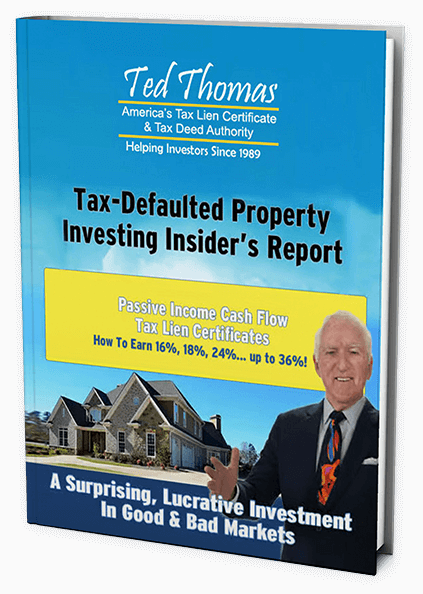Savvy investors know that passive income real estate investing is a popular and lucrative way to generate long-term wealth. However, many people are unaware of the unique opportunities that tax lien certificates and tax deeds present in the alternative real estate sector. Today, we’ll uncover the potential of tax lien certificates and tax deeds as viable real estate investments for creating passive income streams.
We’ll begin by explaining what tax lien certificates and tax deeds are, as well as their differences. Then, we’ll delve into the process of passive investing in real estate using these instruments – from understanding interest rates to participating in auctions for acquiring them.
Lastly, we’ll provide valuable insights on managing your portfolio with passive income real estate investing while emphasizing diversification and risk management techniques for maximizing returns on your passive investments. By the end of this article, you’ll have gained essential knowledge on passive income real estate investing through alternative methods like tax liens and deeds.
Table of Contents:
1. What are Tax Lien Certificates and Tax Deeds?
In this section, we will provide an overview of the basics of tax lien certificates and tax deeds, including what they are, the difference between tax deeds and redeemable tax deeds, and how they can be used to generate real estate passive income.
a. What is a Tax Lien Certificate?
A tax lien certificate is issued by a local government agency when a property owner fails to pay their property taxes on time. The certificate represents a claim against the delinquent property for unpaid taxes plus any interest or penalties that have accrued. You can purchase these certificates at public auctions held by county governments and earn high-interest rates on your investment while helping local governments collect much-needed revenue.
b. What is a Tax Deed?
A tax deed, on the other hand, grants you ownership of a property after it’s been seized due to non-payment of taxes by its previous owner. This means that instead of merely holding onto an interest-bearing debt instrument like with tax lien certificates, investors who purchase tax deeds actually acquire full title to the properties themselves – often at prices well below market value.

c. Difference between Tax Deeds and Redeemable Tax Deeds
The primary difference between regular tax deeds and redeemable ones lies in whether or not former owners have an opportunity to reclaim their properties following foreclosure proceedings initiated by taxing authorities:
- Tax Deeds: Once sold at auction as part of standard foreclosure procedures under state law (which vary from one jurisdiction to another), the original owner loses all rights and interests in their property. The investor who purchases the tax deed becomes its new legal owner, free and clear of any outstanding liens or encumbrances.
- Redeemable Tax Deeds: In some states, former owners have a specific period (known as a redemption period) during which they can repurchase their properties by paying off all back taxes owed plus penalties accrued. If this occurs, investors receive full reimbursement for their initial investment along with a high rate of interest – effectively earning them a guaranteed return on investment regardless of whether or not they ultimately acquire title to the underlying real estate assets themselves.
In both cases, investing in tax lien certificates and tax deeds offers an attractive means to collect passive income through high-interest rates while also providing opportunities for acquiring valuable real estate assets at discounted prices.
Tax Lien Certificates and Tax Deeds are a unique way to invest in real estate with potentially high returns. Now, let’s explore how you can use these tools for passive income investing.
Tax lien certificates and tax deeds are two ways to invest in real estate for passive income. Tax lien certificates represent a claim against delinquent properties for unpaid taxes, while tax deeds grant ownership of the property itself after it has been seized due to non-payment of taxes by its previous owner. Investing in these can provide high-interest rates and opportunities for acquiring valuable real estate at discounted prices.
2. How to Invest in Real Estate with Tax Lien Certificates
Tax lien certificates can be a potentially profitable way to diversify your investments and generate passive income. Investing in tax lien certificates requires understanding the process, interest rates, participating in auctions, obtaining property lists and evaluating the pros and cons.
a. Understanding Interest Rates on Tax Lien Certificates
Tax lien certificate interest rates vary depending on state laws and local regulations. Rates could be 16%, 18%, 24%, or up to 36%, providing you with an attractive return on these passive real estate investments compared to traditional savings accounts or bonds. It’s essential to research each state’s specific rules regarding tax liens, as some states have maximum allowable interest rates while others use a bidding system that may lower potential returns.
b. How Do Tax Delinquent Real Estate Auctions Work?
Tax delinquent real estate auctions are public events where properties with unpaid taxes are sold either through tax lien certificates or tax deeds (depending on the jurisdiction). These auctions provide opportunities for you to purchase properties at discounted prices or earn high-interest returns by purchasing tax lien certificates.
- Register: To participate in a tax delinquent auction, you’ll need first to register as a bidder according to the county’s requirements.
- Bidding: During the auction process itself, bidders compete against one another by placing bids either online or onsite until there is only one winning bid left per property.
- Paying: If you win a bid, you’ll need to promptly pay the full amount of your winning bid and any applicable fees within a specified time frame.
- Receiving: Once payment is made, you will receive either the tax lien certificate or deed for the property, depending on what was auctioned off.
c. Finding the Auctions for Tax Lien Certificates and Property Lists
Finding auctions for tax lien certificates can be done through various resources such as local newspapers, county websites, or a specialized online platform that provides tax sale calendars, like the one we offer. Additionally, many counties offer property lists detailing information about each delinquent property up for auction. These lists are crucial in conducting due diligence before bidding on properties or tax liens at an auction.
d. Strategies for Investing in Real Estate with Tax Liens and Deeds
To maximize returns when investing in real estate using tax liens and deeds, consider implementing these strategies:
- Conduct thorough research on state laws regarding interest rates and redemption periods to ensure potential investments align with your financial goals.
- Analyze historical data from previous auctions to understand trends in bidding activity and average winning bids per jurisdiction.
- Diversify your investment portfolio by targeting different types of commercial or residential properties across multiple jurisdictions with varying risk profiles.
- Create a budget outlining how much capital you’re willing to invest per auction while accounting for additional expenses like legal fees or travel costs if you attend onsite auctions out-of-state.

e. Pros and Cons of Investing in Real Estate with Tax Liens and Deeds
Tax lien certificates offer investors several advantages, such as high-interest rates, low entry costs, and the potential to acquire properties at discounted prices. However, there are also some risks associated with this type of investment:
- Pros:
- Potential for high returns through interest payments or property acquisition
- Lower initial investment compared to traditional real estate purchases
- A relatively passive form of investing that doesn’t require extensive management or maintenance responsibilities
- Cons:
- Possibility of acquiring a property with hidden liabilities that could result in additional expenses and legal complications.
- Overbidding due to not having an exit strategy in place
Investing in real estate with tax lien certificates can be a great way to create passive income. Strategizing can help you attain higher yields while mitigating risk in your passive real estate investments. Exploring strategies for controlling your real estate portfolio is the next step in achieving success in passive income real estate investing.
Investing in real estate with tax lien certificates can generate passive income and diversify investment portfolios. To maximize returns, conduct thorough research on state laws, analyze historical data from previous auctions, target different types of properties across multiple jurisdictions, and create a budget outlining how much capital you’re willing to invest per auction while accounting for additional expenses.
3. Managing Your Investment Portfolio with Real Estate Investing
Effectively managing your investment portfolio is crucial to achieving long-term success in passive income real estate investing. Deploying risk-reduction tactics and optimizing returns are all necessary for successful portfolio management in real estate investing. In this section, we will explore these aspects of portfolio management.
a. Risk Management Strategies for Real Estate Investors
Risk management is essential to protect your financial interests while investing in real estate through tax liens and deeds. Here are some strategies that can help minimize risks:
- Research: Thoroughly research each property before bidding at an auction by checking its location, condition, title history, zoning restrictions etc.
- Evaluate Potential Returns: Calculate expected return on investment (ROI) based on interest rates offered by Tax Lien Certificates or possible resale value after acquiring a Tax Deed property.
- Set a Budget: Determine the maximum amount you’re willing to invest in each property and stick to it during auctions. This will help prevent overbidding.
- Seek Professional Advice: Consult with real estate attorneys, tax advisors, or experienced investors who can provide guidance on navigating the complexities of tax lien and deed investing.
b. Tips for Maximizing Returns on Your Investments
To make the most out of passive income real estate investing through tax liens and deeds, consider these tips:
- Bid Wisely: Be strategic when bidding at auctions by focusing on properties that offer high potential returns while minimizing risks associated with location or property condition issues.
- Sell Strategically: After obtaining ownership through Tax Deeds, you can generate cash flow quickly by selling the investment property outright for a discount, or you can earn real estate passive income streams by offering seller financing, which is also called “owner financing.”
Now let’s focus on ways to generate residual income through passive income real estate investing in tax lien certificates and tax deeds.
By their nature tax lien certificates are passive investments; you simply purchase the tax certificate and wait for the tax delinquent property owner to redeem the certificate by paying you back all of the capital you invested plus a high rate of interest. Since you own the lien, if the property owner doesn’t pay within the redemption period, you can foreclose on the property and get the real estate mortgage-free. Tax lien certificates are passive investments that are secured by real estate, meaning that you either get paid or you get the property.
There are a couple of ways to generate residual income from passive income real estate investing in tax deeds. First of all, at a tax deed auction, you can purchase properties for 10, 20, or 30 cents on the dollar of the tax assessed value, and you get the property without a mortgage or deed of trust loan. By investing in a tax deed property, you’re already miles ahead of other investors because you own a mortgage-free property that has a large profit margin.
You could profit from passive income real estate investing by renting the property out and receiving a residual income from rental payments, or you could sell the property utilizing seller financing.
Passive income real estate investing via seller financing means that you act as the bank by providing the financing, and you receive monthly installment payments plus interest from the buyer for years. There are a lot of eager buyers who are able to afford house payments, but they don’t have a good enough credit rating to receive a home loan from a bank. You as the seller can create passive income by offering the buyer seller financing.
To effectively manage your real estate investment portfolio, implement risk management strategies like researching each property before bidding at auctions, evaluating potential returns based on ROI, setting a budget for each investment, and seeking professional advice from experts. To maximize returns on investments bid wisely at auctions and sell strategically.
Frequently Asked Questions Passive Income Real Estate Investing
Can you make passive income with real estate?
Yes, passive income can be generated through real estate investing by purchasing rental properties, investing in tax lien certificates or tax deeds, and participating in crowdfunded real estate platforms. These real estate investments generate consistent cash flow from rent payments or interest earned without requiring active management.
How to invest $200,000 for passive income?
To invest $200,000 for passive income in real estate, consider options such as buying rental properties like single-family homes or multi-unit buildings; diversifying your portfolio by investing in a Real Estate Investment Trust (REIT); or exploring online crowdfunding platforms that offer opportunities to invest in various types of property projects.
How to earn passive income in real estate with $1,000 dollars?
Earning passive income with a $1,000 investment is possible through REITs and crowdfunded real estate platforms. Both options allow investors to pool their money together and participate in larger-scale projects while earning returns on their investment through dividends or profit distributions. Additionally, passive income real estate investing in tax lien certificates can be done with $1,000 or even less since tax liens come in a wide range of amounts.
What are the pros and cons of passive real estate investing?
The pros of passive income real estate investing include generating steady cash flow without active involvement; potential appreciation over time; diversification benefits; and favorable tax treatment. Cons may involve limited control over property management decisions; potential illiquidity depending on the type of investment vehicle chosen; and risks associated with market fluctuations.
Conclusion
If you’re interested in passive income real estate investing, tax lien certificates and tax deeds are two options if you want to start investing in the real estate market without having to actively manage properties.
By comprehending the distinctions between tax liens and deeds of sale, as well as how auctions function, you can make enlightened choices regarding which tactic is best for you.
Tax lien certificates are secured by real estate and pay interest rates of up to 36%, making them not only a low-risk passive investment but also an excellent hedge against inflation.
Tax deeds are properties that can be purchased outright for discounts of 60%, 70%, 80% or more, and you get the property without a mortgage. By offering seller financing when you sell the property, you can generate income monthly for years.
Start your money-making journey by attending Ted’s 7-Hour foundational training. Download your Free Insiders Report & Book your seat today to attend the Retire Rich From Home Virtual Workshop.
Want to earn massive income from bargain real estate investing? Would you like to buy mortgage-free homes for pennies on the dollar? Or earn double-digit interest rates secured by real estate? Get started today with this Free Gift.

Ted Thomas is America’s Leading Authority on Tax Lien Certificates and Tax Deed Auctions, as well as a publisher and author of more than 30 books. His guidebooks on Real Estate have sold in four corners of the world. He has been teaching people just like you for over 30 years how to buy houses in good neighborhoods for pennies on the dollar. He teaches how to create wealth with minimum risk and easy-to-learn methods.




